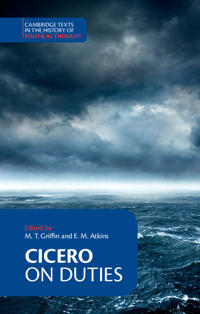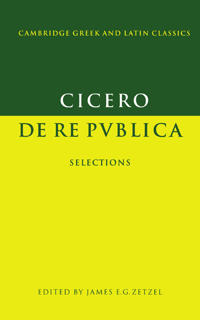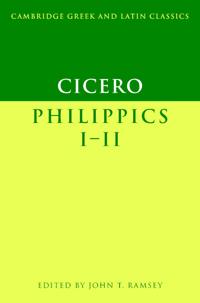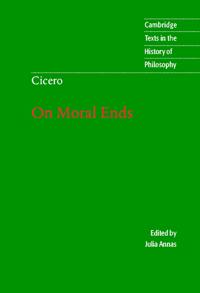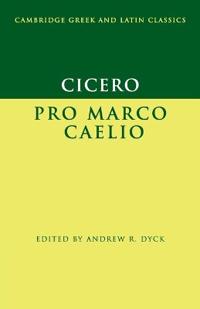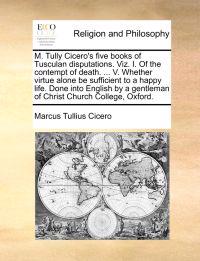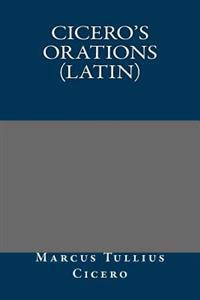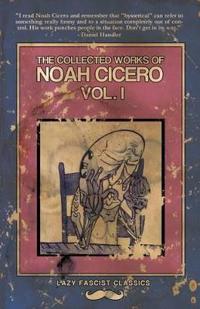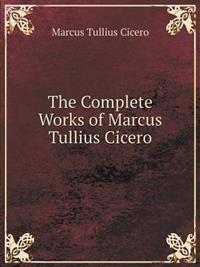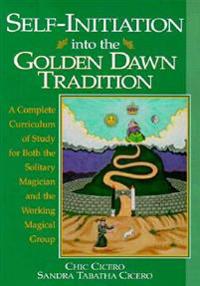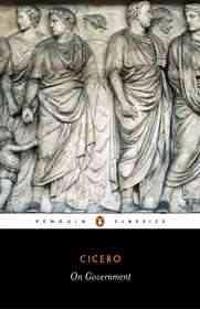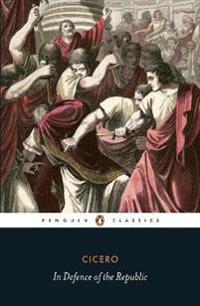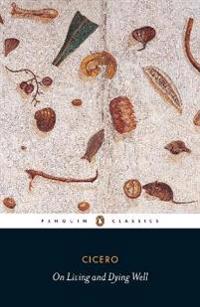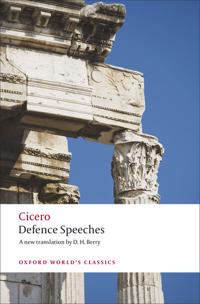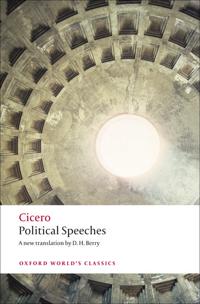Cicero (Inbunden)
avMarcus Tullius Cicero, D. R. (TRN) Shackleton Bailey, Marcus Tullius Cicero
ISBN: 9780674995727 - UTGIVEN: 1999-04In letters to his dear friend Atticus, Cicero reveals himself as to no other of his correspondents except, perhaps, his brother. These letters, in this four-volume series, also provide a vivid picture of a momentous period in Roman history--years marked by the rise of Julius Caesar and the downfall [...]
Cicero: On the Ideal Orator (de Oratore) (Pocket)
avMarcus Tullius Cicero
ISBN: 9780195091984 - UTGIVEN: 2001-04-01Cicero Orationes: (Pro Milone, Caesarianae, Philippicae.): Volume 2 (Inbunden)
avMarcus Tullius Cicero
ISBN: 9780198146063 - UTGIVEN: 1963-03-26Cicero Rhetorica: (De Oratore): Volume 1 (Inbunden)
avMarcus Tullius Cicero
ISBN: 9780198146155 - UTGIVEN: 1963-03-26Cicero's Speech: Pro Rabirio Postumo (Pocket)
avMarcus Tullius Cicero
ISBN: 9780199240968 - UTGIVEN: 2001-05-10Cicero: On Duties (Häftad)
avMarcus Tullius Cicero
ISBN: 9780521348355 - UTGIVEN: 1991-02De Officiis (On Duties) was Cicero?s last philosophical work. In it he made use of Greek thought to formulate the political and ethical values of Roman Republican society as he saw them, revealing incidentally a great deal about actual practice. Writing at a time of political crisis after the assass[...]
Cicero De re Publica (Pocket)
avMarcus Tullius Cicero
ISBN: 9780521348966 - UTGIVEN: 1995-05Cicero?s De re publica contains the fullest ancient account of the theory of the mixed constitution and the oldest extant narrative of early Roman history; it concludes with the Dream of Scipio, one of the most influential ancient visions of the afterlife. The argument of the dialogue concerns the r[...]
Cicero: Philippics I-II (Häftad)
avMarcus Tullius Cicero
ISBN: 9780521422857 - UTGIVEN: 2003-09This edition is the first since J. D. Denniston?s of 1926 to present the Latin text of and a commentary on the First and Second Philippics, two of the most polished orations in the Ciceronian corpus. These speeches, which were composed less than six months after the murder of Julius Caesar in March [...]
Cicero: On Moral Ends (Inbunden)
avMarcus Tullius Cicero
ISBN: 9780521660617 - UTGIVEN: 2001-08This 2001 translation makes one of the most important texts in ancient philosophy available to modern readers. Cicero is increasingly being appreciated as an intelligent and well-educated amateur philosopher, and in this work he presents the major ethical theories of his time in a way designed to ge[...]
Cicero (Inbunden)
avMarcus Tullius Cicero
ISBN: 9780674992962 - UTGIVEN: 1940-06Cicero (Marcus Tullius, 10643 BCE), Roman lawyer, orator, politician and philosopher, of whom we know more than of any other Roman, lived through the stirring era which saw the rise, dictatorship, and death of Julius Caesar in a tottering republic. In his political speeches especially and in his cor[...]
Cicero: Pro Marco Caelio (Inbunden)
avMarcus Tullius Cicero
ISBN: 9781107014428 - UTGIVEN: 2013-06-30New edition of and detailed commentary on perhaps Cicero's best-loved speech, suitable for advanced undergraduates and graduate students.[...]
Cicero: Pro Marco Caelio (Häftad)
avMarcus Tullius Cicero
ISBN: 9781107643482 - UTGIVEN: 201304Pro Marco Caelio is perhaps Cicero's best-loved speech and has long been regarded as one of the best surviving examples of Roman oratory. Speaking in defence of the young aristocrat Marcus Caelius Rufus on charges of political violence, Cicero scores his points with wit but also with searing invecti[...]
Letters of Cicero (Pocket)
avCicero, Marcus Tullius
ISBN: 9781406846010A series of letters of Cicero ranging from informal communications with family members to elaborate compositions.[...]
The Collected Works of Noah Cicero Vol. I (Häftad)
avNoah Cicero
ISBN: 9781621050919 - UTGIVEN: 201304The Complete Works of Marcus Tullius Cicero (Häftad)
avMarcus Tullius Cicero
ISBN: 9785519059381 - UTGIVEN: 2014-03Tarot Talismans (Pocket)
avChic Cicero, Sandra Tabatha Cicero, Chic Cicero
ISBN: 9780738708713 - UTGIVEN: 200607According to Chic & Sandra Tabatha Cicero, the tarot is much more than a collection of symbolic images-it's a vibrant ecosystem of interconnected energies and entities. In this groundbreaking approach to tarot, they introduce how these powerful cards can be magically transformed into talismans and a[...]
Self-Initiation into the Golden Dawn Tradition (Pocket)
avChic Cicero, Sandra Tabatha Cicero, Chic Cicero
ISBN: 9781567181364 - UTGIVEN: 199506Regardless of your magical knowledge or background, you can learn and live the magical Golden Dawn tradition with this guide to Golden Dawn initiation. This book offers self-paced, clear instruction. Upon completion of this workbook, the reader can be a practicing Golden Dawn magician with knowledge[...]
On Government (Pocket)
avMarcus Tullius Cicero, Michael (TRN) Grant, Marcus Tullius Cicero
ISBN: 9780140445954 - UTGIVEN: 1994-03These pioneering writings on the mechanics, tactics, and strategies of government were devised by the Roman Republic's most enlightened thinker.[...]
In Defence of the Republic (Pocket)
avMarcus Tullius Cicero, Siobhan (TRN) Mcelduff, Marcus Tullius Cicero
ISBN: 9780140455533 - UTGIVEN: 2011-11Cicero (106-43BC) was the most brilliant orator in Classical history. Even one of the men who authorized his assassination, the Emperor Octavian, admitted to his grandson that Cicero was: 'an eloquent man, my boy, eloquent and a lover of his country'. This new selection of speeches illustrates Cicer[...]
On Living and Dying Well (Pocket)
avMarcus Tullius Cicero, Thomas (TRN) Habinek, Marcus Tullius Cicero
ISBN: 9780140455564 - UTGIVEN: 2012-11In the first century BC, Marcus Tullius Cicero, orator, statesman, and defender of republican values, created these philosophical treatises on such diverse topics as friendship, religion, death, fate and scientific inquiry. A pragmatist at heart, Cicero's philosophies were frequently personal and et[...]
Defence Speeches (Pocket)
avCicero, D. H. Berry, Cicero
ISBN: 9780199537907 - UTGIVEN: 200908'But I must stop now. I can no longer speak for tears - and my client has ordered that tears are not to be used in his defence.' Cicero (106-43 BC) was the greatest orator of the ancient world: he dominated the Roman courts, usually appearing for the defence. His speeches are masterpieces of persu[...]
Political Speeches (Pocket)
avCicero, D. H. Berry, Cicero
ISBN: 9780199540136 - UTGIVEN: 200903'Two things alone I long for: first, that when I die I may leave the Roman people free...and second, that each person's fate may reflect the way he has behaved towards his country.' Cicero (106-43 BC) was the greatest orator of the ancient world and a leading politician of the closing era of the Rom[...]






